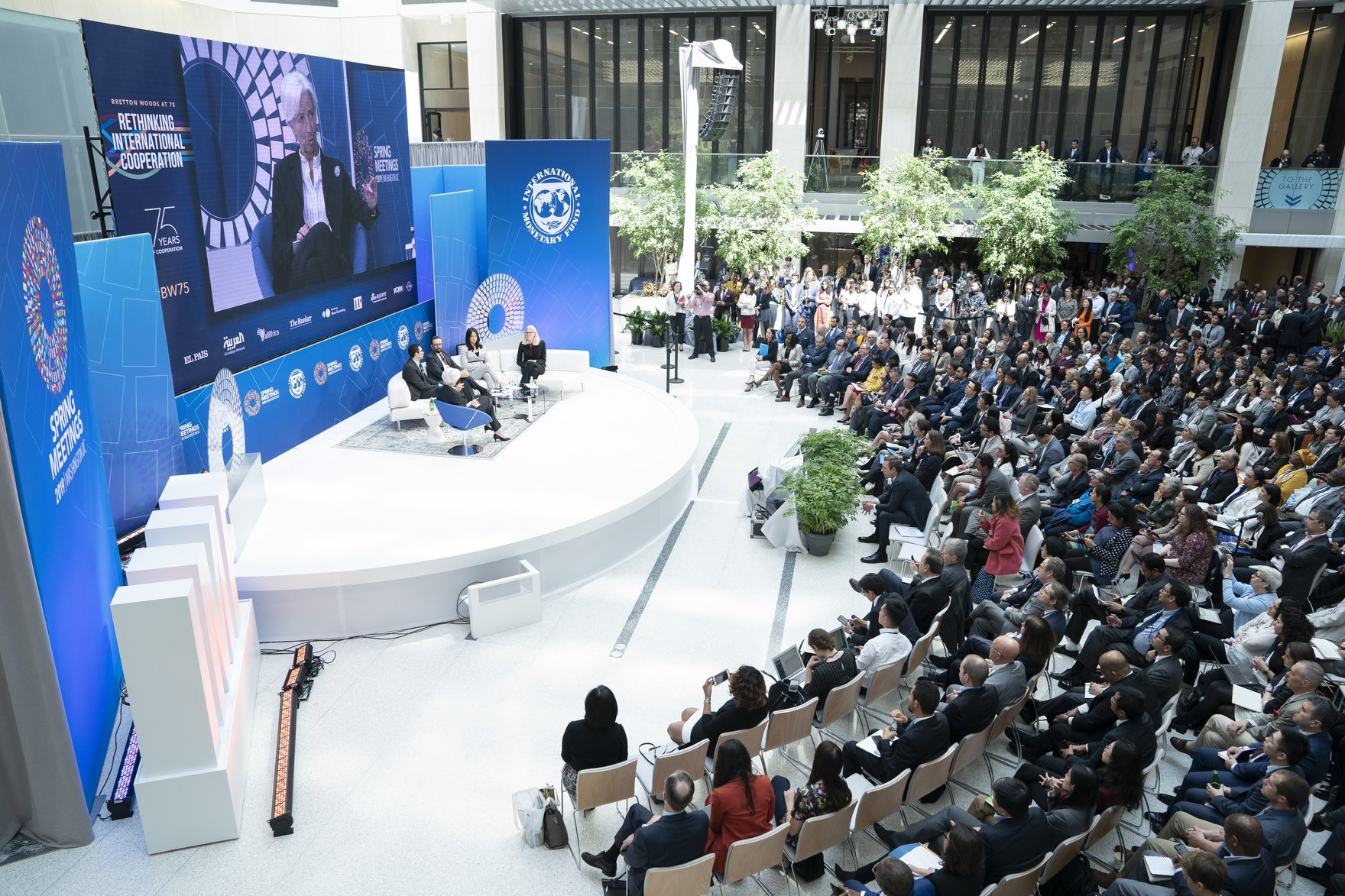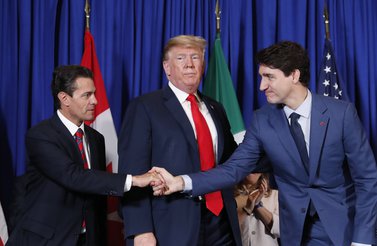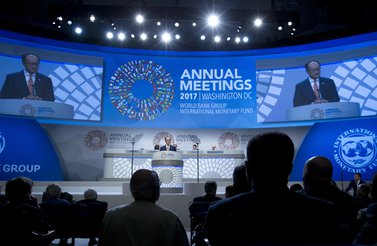Christine Lagarde, managing director of the International Monetary Fund (IMF) will host the Spring Meetings of the IMF and World Bank Group from April 12 to 14. And while growing uncertainty about global economic prospects casts a cloud over the meetings, that is not her biggest worry. Lagarde has the unenviable task of leading the IMF at a time of increasing political polarization and rising economic nationalism.
Similar forces contributed to economic stagnation in the 1930s and led the march to war in 1939. They also created the zero-sum perspective on international trade and finance, as countries sought to preserve employment through beggar-thy-neighbour policies that made everyone worse off. That perspective spilled over to diplomacy and security with horrific consequences.
Amid that chaos and global war, the IMF was created to restore the international economy as a positive-sum game in which all who play by the rules benefit. Together with other rules-based institutions covering trade and development, the Fund succeeded in resuscitating trade and restoring global growth. The rules-based order, whose foundations were laid at the Bretton Woods conference 75 years ago, has been a wellspring of prosperity for millions around the globe.
Recently — and certainly since the election of US President Donald Trump — it seems that system is at risk.
The Weakening of Global Economic Cooperation
The Trump administration has pursued a consistent, if not conscious, policy of weakening the institutions of international cooperation. The goal may be to return to a zero-sum game economy in which the United States is free to leverage its size to secure more favourable terms. While this America-first approach is intended to benefit the United States (recent research from the IMF says otherwise), it risks the gains from greater financial and economic integration. The US may get a bigger piece of a shrinking pie. Over time, however, all could be harmed, including the United States.
This prospect has been discussed and written about since Trump came into office; nevertheless, it should — more than ever — alarm the finance ministers and central bankers attending the IMF and World Bank meetings this week. This year, the threat is magnified by a short-term irony and a long-term challenge.
The irony is that while Trump blames currency manipulation and “poorly negotiated” trade deals for the US trade deficit, his own policies are producing record trade deficits. The tax cuts and higher spending that Republications were championing a year ago have contributed to fiscal deficits, even as the United States is at or below full employment. Rather than unleash a new Prometheus of growth that would pay for the tax cuts, this deterioration in public finances fuels external imbalances. Moreover, while China was managing its currency to prevent its appreciation a decade or more ago, today Beijing is preventing the Renminbi from falling.
These facts won’t stop the Trump administration from citing unfair practices and bad trade deals for the “American carnage.” And as the 2020 election nears, look for increasingly disruptive actions to deflect attention from the simple truth that Trump’s trade policies are not working.
The long-term challenge to the rules-based order comes from underlying shifts in global economic power. For the past four decades, China has pursued market-based reforms and greater integration in the global economy, with spectacular results. Global poverty has fallen steadily as incomes have risen in China. This remarkable progress would not have been possible without access to global capital and markets, and preferential considerations given to developing countries.
The Chinese success story is a testament to the rules-based order. That order imposes obligations on its members. And with increased prosperity and greater economic heft, there is a concomitant responsibility for sustaining the system. Going forward, China must demonstrate its commitment to the system and prove that it is not merely “gaming” the system to achieve rapid growth.
At the same time, the US role as guardian of the system is being eroded by the Trump administration’s policies and the decline in the United States’ share of the global economy.
So, what can Lagarde do to hold the centre together and preserve the global economy as a positive-sum game?
Resurrecting Full Employment Consensus
First, the IMF must acknowledge that the resurgent forces of economic nationalism and political populism have many causes, including rising inequality in several countries. This problem was exacerbated by the economic disruption of the global financial crisis and the tepid recovery that followed, just as the Great Depression planted the seeds for the polarization of the 1930s.
One of the IMF’s initial objectives was to assist its members in achieving full employment by relaxing the constraints on domestic policies that the dysfunctional interwar gold standard imposed. Sadly, the lessons of earlier years were lost or forgotten in the pursuit of politically motivated austerity in the post-crisis period, imposing hardships on workers already reeling from the challenges of adjusting to low-wage foreign labour.
Going forward, Lagarde must resurrect the full employment consensus and lead the search for policies to address the disturbing trends seen in many member countries.
Building a Framework for Exchange Rate Surveillance
Second, she will have to respond to the trade challenges posed by the Trump administration. These range from the use of tariffs to enhance bargaining position in trade negotiations to undermining the effectiveness of the World Trade Organization appellate body by withholding the nominations required to form a quorum. The administration justifies its disruptive measures by the blatant manipulation of exchange rates permitted under trade agreements that are “unfair” to the United States. Such concerns explain its decision to insert clauses prohibiting currency manipulation into bilateral trade agreements.
This policy represents a decisive break with past practice. In the post-war period, the IMF facilitated trade liberalization by policing exchange rates: a country would not remove tariff and non-tariff barriers if another could secure a competitive advantage by manipulating its currency. To be fair, it is widely acknowledged that IMF exchange rate surveillance lacks teeth; US frustration with its perceived failings is a longstanding theme in international finance. However, the policy of using bilateral trade agreements to prevent currency manipulation threatens international cooperation by taking exchange rates and trade balances from the multilateral context, where they belong, and putting them in a bilateral setting in which the United States can exploit its large size to its advantage. The policy thus increases the risks to the rules-based trade and financial system by impairing the effectiveness of the IMF at a critical juncture.
Given these risks, Lagarde must work with Fund members to come up with a framework for effective exchange rate surveillance. The system must be enforceable, and must also entail obligations on all members, including those issuing reserve assets. This is a tall order; the prospects for success are unclear. However, failure to tackle it could consign the IMF to growing irrelevancy.
Preserving the IMF’s Legitimacy
Third, Lagarde has to preserve the legitimacy of the IMF while it is under attack by its largest shareholder and is simultaneously viewed as unrepresentative by many of its emerging market members. This may be the most challenging assignment. Many of the IMF’s members contend that IMF quotas, a key determinant of voting and other governance arrangements, reflect the global economy as it was in the mid-twentieth century, rather than the global economy today. A better distribution of control over the institution is a prerequisite, they argue, for legitimacy.
Individually, these three priorities are challenging. Together, they seem intractable. That sobering conclusion should not prevent efforts to move forward. Indeed, the greater the threat to shared prosperity, the bigger the incentive to work together to preserve the rules-based system can be. That was the glue that held a diverse group of countries together at Bretton Woods.
Unfortunately, the biggest obstacle to a renewed Bretton Woods is its largest member — a member with a veto over fundamental changes to the institution. Not only is the Trump administration intent on weakening the rules-based order, it has squandered the trust on which international cooperation depends. Meanwhile, China, the IMF’s second largest member (largest, depending on the exchange rate used), itself faces significant economic, social and political challenges, while its commitment to the international rules of the game is questioned. In these circumstances, it is difficult to envision a scenario in which the two collaborate, as the United States and the United Kingdom did 75 years ago at Bretton Woods.





